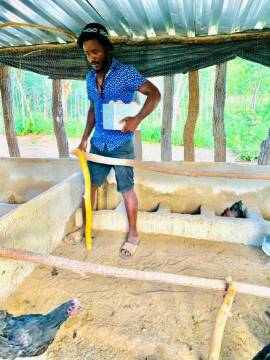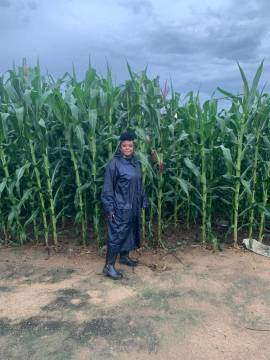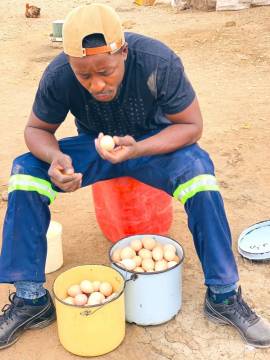
The Sunday Mail

Tanyaradzwa Mutizwa and Wallace Ruzvidzo
IT is being touted as the beginning of what could yet be another tectonic shift in the evolving history Zimbabwe’s agrarian revolution.
When heroes of the country’s liberation struggle led the Fast-Track Land Reform Programme towards the turn of the millennium, most of today’s youths were still too young to directly assume tittle to the land that was being reclaimed from white former owners.
Instead the land was given to their parents, who were old enough to become landholders.
But just as Zimbabwean youths of the generation gone by, sowed the seeds that nurtured the country’s journey towards political liberation, today’s youths are slowly taking the lead in yet another generational fight for economic independence through working the land.
An increasing number of local youths are slowly laying claim to the country most treasured heritage — the land — and steering what appears to be a changing of the guard through leading what appears to be embryonic mini-agriculture revolution.
In the past, farming was seen as a domain for the less educated and poor, but perceptions are shifting fast, with an increasing number of local youths venturing into full-time commercial farming.
Scores of young and innovative agri-entrepreneurs are changing the face of the agriculture landscape through making farming fashionable.
Success stories
Twenty-eight-year-old Terence Maphosa, who breeds free range chickens at his small family plot in Mhondoro-Ngezi, Mashonaland West, has become the face of this new spirit on land.
Maphosa has harnessed the reach and power of the social media to publicise his fledgling enterprise and inspire an increasing number of his peers to take a leap of faith and venture into agribusiness.
On Twitter, where he uses the handle @terrymap1 to interact with his over 26 000 followers, he puts up posts showing a young man living rudimentary, yet authentic rural life with an appreciation of traditional food.
Maphosa, who is Political Science graduate from the University of Zimbabwe, regularly updates his followers on his chicken business, usually eliciting praise and admiration from the young and old alike.
He started his small venture four years ago but struggled to gain traction and contemplated giving up.
He, however, soldiered on against the odds.
Today, he is a proud owner of thousands of chickens that includes breeds such as Black Australorp, Koekoek, Light Sussex, Kuroila and Jersey Giant.
“Through Facebook, Twitter and Instagram, which are populated by the youth, I have managed to reach out to thousands of my peers who see the work I do daily on the farm,” he told The Sunday Mail last week.
“Updating my farming journey on social media has brought out the hunger in youths who are now daring to go into farming and I am glad that a lot of young people have been inspired by my journey.”
Through harnessing new technologies and social media, which allows them to synergise and share ideas in real time, local youths are broadcasting to the world the mutating face of the country’s agrarian reform programme, which is being led by the young.
Hashtags such as #ZimAgricRising #ZimYouthsinAgriculture #ZimYouthCan #RimaSomething have been used as rallying calls for others to join in the renaissance.
The anticipated success of the 2020-2021 summer cropping season has proven a boon for young farmers.
Mr Brighton Mutana (32) is fast turning into a trailblazing farmer in Hwedza, Mashonaland East.
On a small six-hectare plot that he rents, Mr Mutana grows tobacco, maize and sugar beans.
He has grown into a leading supplier of maize and beans to local boarding schools over the years.
“I have been supplying my produce, especially maize and beans, to local boarding schools for years now,” he said.
“Young people should not be scared of venturing into agriculture because there is a lot of money to be made from tilling the land.
“The fact that there are no formal jobs in the city means that as youths we have to take up the challenge and create our own jobs.”
He dreams of growing his venture into a large commercial enterprise that supplies food crops countrywide.
Mutana plans to venture into horticulture but he has struggled to access funding to get the venture off the ground.
“Financial institutions are generally reluctant to consider extending loans to young farmers,” he said.
“When they offer the loans, the conditions are punitive.”
Zanu pf legislator (proportional representation) Tatenda Mavetera (34) is yet another youthful agri-entrepreneur making waves as a successful commercial pig farmer.

Mr Maphosa shows his road runner breeder project in Mhondoro Ngezi
Lands, Agriculture, Water, Fisheries and Rural Resettlement Permanent Secretary Dr John Basera (right) met up with Mr Terrence Maphosa at his office on Thursday

Honourable Tatenda Mavetera shows part of her flourishing maize crop

. . . sorts out some of the eggs from his poultry project
She said youths should use agriculture as a vehicle to escape unemployment and poverty.
“I believe young people should not sit back and watch others make money from farming,” she said.
“Youths should show interest and get involved, especially now that we have a Government that is giving unprecedented support to agriculture.
Government moves in
Lands, Agriculture, Water, Fisheries and Rural Resettlement Permanent Secretary Dr John Basera said agriculture was the bedrock upon which Zimbabwe will transform into an upper middle-income economy.
“We need to harness the youth bulge into a demographic dividend,” said Dr Basera.
“There is no doubt and we cannot overemphasise the importance of agriculture to the attainment of Vision 2030. It is even smarter if we crowd in the participation of youths in the agriculture space.
“Dear youths, starting to farm is like drinking hot tea: it gets easier after the first sip.
“First sip is always hot but gets easier, tastier and you enjoy it as you go on. Take the first step and get things done! Never fear paying entry-level fees but learn your mistakes and grow.”
He said the National Development Strategy 1 was creating opportunities for youths and women in sectors like agriculture.
“We have a youth bulge that we need to harness for the benefit of the economy, so we do that by creating opportunities for the youths. We want to create model youth farmers and harness their energy and enthusiasm. On the policy front, we need to come up with a quota system for strategic groups such as war veterans, women, youths and the disabled. There is already a quota system for war veterans and women and we need one for youths.”
Yesterday, President Mnangagwa said the Government will prioritise allocating underutilised land to youths.



